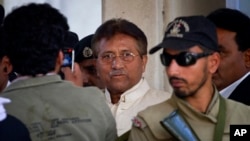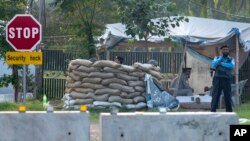ISLAMABAD —
Police in Pakistan have rearrested former military president Pervez Musharraf, a day after he was granted bail in other cases that apparently had paved the way for ending his six months of house arrest.
A senior police officer told reporters Thursday that Musharraf has been rearrested in connection with a military operation he ordered in 2007 against a mosque in Islamabad.
The bloody crackdown was launched to flush out a group of heavily armed militants entrenched inside the so-called Red Mosque including its pro-Taliban cleric. But the move angered Islamic parties and they accused then President Musharraf of killing dozens of innocent students along with the radical cleric just to appease the United States.
However, Musharraf and his supporters denied the charges. Legal experts like Supreme Court lawyer Anis Jilani also questioned the motives for implicating the former military ruler in the case.
"It was mostly a collective decision. If you look at the newspapers of that period, you will see that almost the whole of media and almost the whole country, it was united and it was clamoring for the state to intervene and get rid of these militants," said Jilani.
Police said that a complaint against the former president in the case was registered two weeks ago on the orders of a judge, paving the way for Thursday’s arrest.
The move came a day after Pakistan’s Supreme Court granted Musharraf bail in the last of the three major cases pending against him.
Musharraf, the one-time military strongman, has been under house arrest at his villa outside Islamabad since April. The criminal charges he faces in the three cases are related to his nine years in power, from 1999 to 2008.
He had already been granted bail in two of the three legal battles and Wednesday’s court decision to grant him bail in the third had apparently set the stage for the 70-year-old retired general to walk out of his house arrest.
Legal experts believed he would eventually win bail in the latest case because it also lacked substance. However, Musharraf’s spokeswoman, Aasiya Ishaq, has dismissed speculation he will flee the country as soon as he is freed.
“Presently he is staying here in Pakistan [and] he is not going anywhere. He has absolutely no plan in the near future to leave the country,” she said.
She said that instead of worrying about politically-motivated legal battles, Musharraf has been enjoying detention because it has allowed him to write his memoirs.
“He has written, almost completed, his book and it explains what are the reasons behind his coming back to Pakistan, what made him go ahead in spite of few friends who insisted that he should not come back to Pakistan at all because his life can be in jeopardy,” said Ishaq.
After stepping down as president in disgrace in 2008, Musharraf left the country and spent nearly four years in self-imposed exile. He returned to Pakistan earlier this year with a plan to run for political office, but was disqualified from running in the parliamentary elections this past May.
In one of the legal cases, Musharraf is accused of playing a role in the 2007 assassination of former Pakistani leader Benazir Bhutto.
A senior police officer told reporters Thursday that Musharraf has been rearrested in connection with a military operation he ordered in 2007 against a mosque in Islamabad.
The bloody crackdown was launched to flush out a group of heavily armed militants entrenched inside the so-called Red Mosque including its pro-Taliban cleric. But the move angered Islamic parties and they accused then President Musharraf of killing dozens of innocent students along with the radical cleric just to appease the United States.
However, Musharraf and his supporters denied the charges. Legal experts like Supreme Court lawyer Anis Jilani also questioned the motives for implicating the former military ruler in the case.
"It was mostly a collective decision. If you look at the newspapers of that period, you will see that almost the whole of media and almost the whole country, it was united and it was clamoring for the state to intervene and get rid of these militants," said Jilani.
Police said that a complaint against the former president in the case was registered two weeks ago on the orders of a judge, paving the way for Thursday’s arrest.
The move came a day after Pakistan’s Supreme Court granted Musharraf bail in the last of the three major cases pending against him.
Musharraf, the one-time military strongman, has been under house arrest at his villa outside Islamabad since April. The criminal charges he faces in the three cases are related to his nine years in power, from 1999 to 2008.
He had already been granted bail in two of the three legal battles and Wednesday’s court decision to grant him bail in the third had apparently set the stage for the 70-year-old retired general to walk out of his house arrest.
Legal experts believed he would eventually win bail in the latest case because it also lacked substance. However, Musharraf’s spokeswoman, Aasiya Ishaq, has dismissed speculation he will flee the country as soon as he is freed.
“Presently he is staying here in Pakistan [and] he is not going anywhere. He has absolutely no plan in the near future to leave the country,” she said.
She said that instead of worrying about politically-motivated legal battles, Musharraf has been enjoying detention because it has allowed him to write his memoirs.
“He has written, almost completed, his book and it explains what are the reasons behind his coming back to Pakistan, what made him go ahead in spite of few friends who insisted that he should not come back to Pakistan at all because his life can be in jeopardy,” said Ishaq.
After stepping down as president in disgrace in 2008, Musharraf left the country and spent nearly four years in self-imposed exile. He returned to Pakistan earlier this year with a plan to run for political office, but was disqualified from running in the parliamentary elections this past May.
In one of the legal cases, Musharraf is accused of playing a role in the 2007 assassination of former Pakistani leader Benazir Bhutto.





